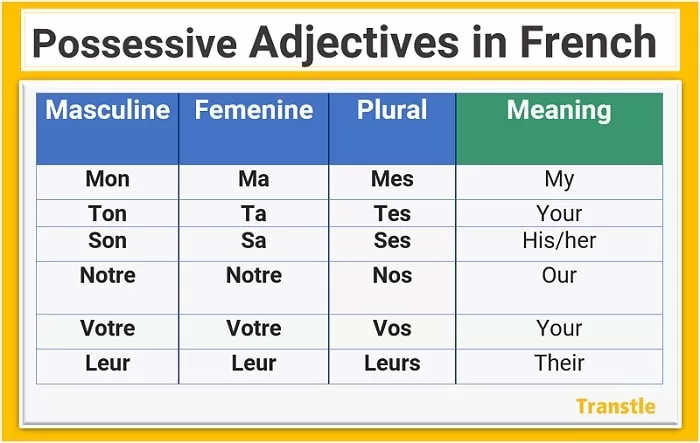Possessive Adjectives in French

Possessive adjectives (adjectifs possessifs in French) are words that express ownership or possession. Just like in English, they tell you whose something is (e.g., my car, your shoes). The key difference in French is that these adjectives agree in gender and number with the noun they modify (the thing being possessed).
For example:
- My car, my cars (English: “My” is fixed)
- Ma voiture, mes voitures (French: “My” changes.)
In French, the adjective changes based on the voiture (singular/plural, masculine/feminine).
French Possessive Adjective Forms
Here’s how they change based on the possessor and the noun being possessed:
| Possessor | Form for Singular Masculine Nouns | Form for Singular Feminine Nouns | Form for Plural Nouns (M/F) | English Meaning |
|---|---|---|---|---|
| Je (I) | mon | ma | mes | my |
| Tu (You singular informal) | ton | ta | tes | your |
| Il/Elle/On (He/She/One) | son | sa | ses | his/her/its |
| Nous (We) | notre | notre | nos | our |
| Vous (You plural/formal) | votre | votre | vos | your |
| Ils/Elles (They) | leur | leur | leurs | their |
How French Possessive Adjectives Agree
Agreement in Gender:
- For “my,” “your” (singular), and “his/her/its,” the possessive adjective changes based on whether the noun is masculine or feminine.
Examples
- Ton professeur. (Your male professor.)
- Ta professeure. (Your female professor.)
- Sa sœur. (His/Her sister – sœur is feminine.)
- Sa voiture. (His/Her car – voiture is feminine.)
- Son crayon. (His/Her pencil – crayon is masculine.)
Exception: For nous (our), vous (your), and ils/elles (their), the singular form (notre, votre, leur) does not change with gender.
- Notre professeur. (Our male professor.)
- Notre professeure. (Our female professor.)
Agreement in Number:
If the noun being possessed is plural, you must use the plural form of the possessive adjective (mes,tes,ses,nos,vos,leurs).
Examples
- Ta chemise. (Your shirt – singular)
- Tes chemises. (Your shirts – plural)
- Ton doigt. (Your finger – singular)
- Tes doigts. (Your fingers – plural)
- Notre ami. (Our friend – singular)
- Nos amies. (Our friends – plural)
Exception: Feminine Nouns Starting with a Vowel or Silent ‘h’
To avoid a clash of vowels (or a vowel sound with a silent ‘h’), you use the masculine singular form (mon,ton,son) even if the noun is feminine.
Examples
- Mon attention (f). (My attention.)
- Ton attitude (f). (Your attitude.)
- Son histoire (f). (His/Her history.)
- Mon hygiène (f). (My hygiene.)
Related: The plural in French
Examples of Possessive Adjectives in Action
- Mon mari est ici. (My husband is here.)
- Ma voiture est blanche. (My car is white. – voiture is feminine)
- Mes amis viennent aujourd’hui. (My friends are coming today.)
- Ton livre est bon. (Your book is good.)
- Ta famille est belle. (Your family is beautiful.)
- Tes yeux sont gris. (Your eyes are gray.)
- Son travail est en France. (His/Her job is in France.)
- Sa détermination est incroyable. (His/Her determination is incredible.)
- Leurs enfants sont calmes. (Their children are calm.)
- Notre avion part plus tard. (Our plane leaves later.)
- Nous avons nos raisons de le faire. (We have our reasons to do it.)
- Votre élève est intelligent. (Your student is intelligent.)
- Vos élèves sont intelligents. (Your students are intelligent.)